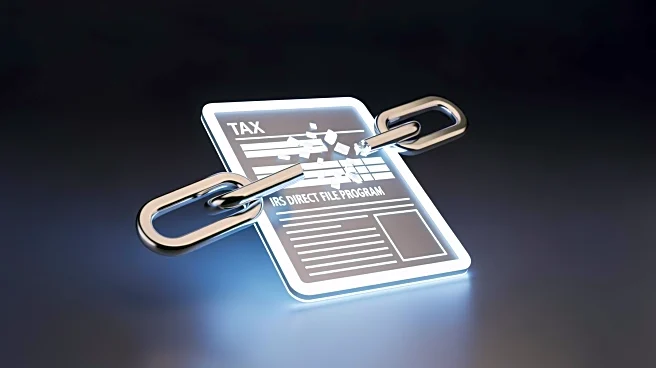What's Happening?
The Internal Revenue Service (IRS) has officially terminated its Direct File program, which allowed eligible taxpayers to file their federal tax returns directly with the IRS for free. This decision was
communicated to 25 states that participated in the program, indicating that it will not be available in the 2026 filing season, and no future launch date has been set. The IRS cited the availability of other free filing options, such as IRS Free File and Free Fillable Forms, as alternatives. The Direct File program was limited to taxpayers with simple tax situations who claimed the standard deduction, and did not support most 1099 forms, business or rental income, or miscellaneous income. Despite its limitations, the program was used by hundreds of thousands of taxpayers and had expanded to include more states and new tax credits since its launch in 2024.
Why It's Important?
The termination of the IRS Direct File program is significant as it affects taxpayers who relied on this free service to file their taxes. The decision may lead to increased costs for taxpayers who now have to turn to private tax software services, which have been criticized for raising filing fees. This move could disproportionately impact working-class taxpayers who benefited from the cost savings provided by the Direct File program. The IRS's decision has drawn criticism from political figures, such as Senate Finance Committee Ranking Member Ron Wyden, who argued that the move benefits large tax software companies at the expense of taxpayers. The availability of alternative free filing options, like IRS Free File, is limited to those with adjusted gross incomes of $84,000 or less, potentially excluding a significant portion of taxpayers.
What's Next?
While the IRS has ended the Direct File program, it will continue to offer other free filing options, such as IRS Free File and Free Fillable Forms, to eligible taxpayers in 2026. These alternatives rely on proprietary tax software from companies in the Free File Alliance, which may not be as comprehensive as the Direct File program. Taxpayers will need to explore these options or consider paid services for filing their returns. The decision may prompt discussions among policymakers and stakeholders about the need for accessible and affordable tax filing solutions, especially for those with limited financial resources.
Beyond the Headlines
The discontinuation of the Direct File program raises broader questions about the role of government in providing essential services to citizens. It highlights the tension between public services and private sector solutions, particularly in areas where cost savings for taxpayers are significant. The move may also influence future policy debates on tax filing accessibility and the potential need for government intervention to ensure equitable access to tax filing services.









